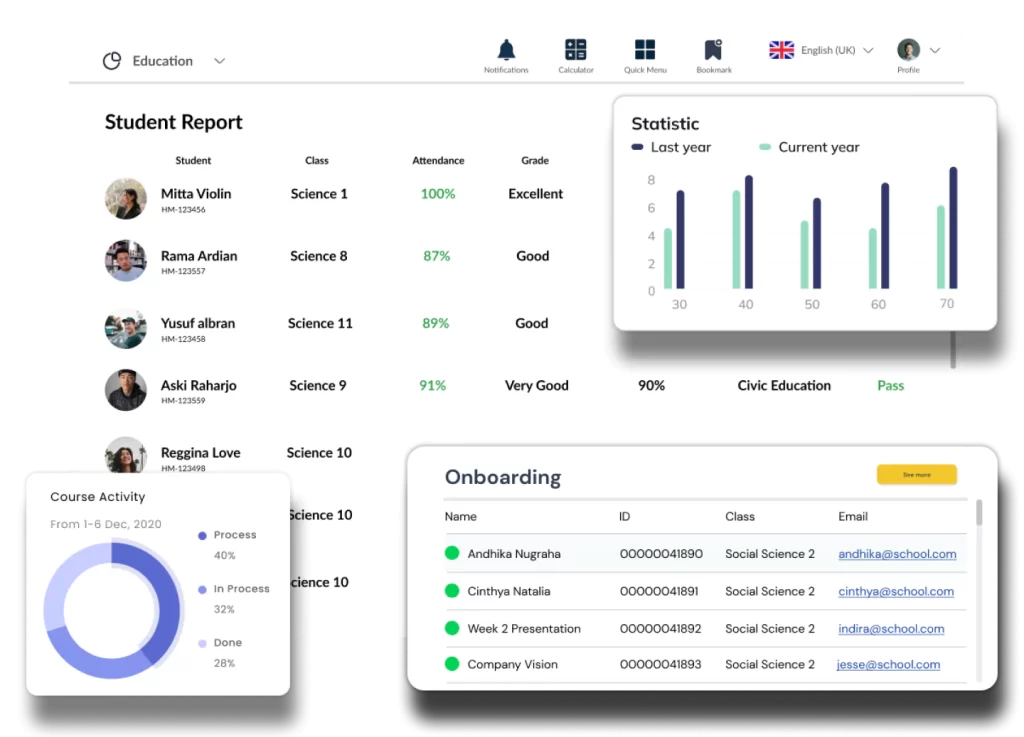Efficient school management is pivotal to fostering a thriving educational environment. In Singapore, renowned for its commitment to academic excellence, effective school administration plays a vital role in shaping the success of its education system.
With over 350 primary and secondary schools accommodating a diverse student population, the need for streamlined management practices is paramount. Here are the most effective ways to improve school management:
Key Takeaways
|
Table of Content:
Table of Content

Provide updated information
Information is the most important thing in the internet era. If you want to improve the school services, you must first provide the latest information about student development in your school.
So, the best school management system must have an information portal that is accessible at any time and anywhere for students and their parents. With the portal, parents don’t have to come to school to look for information about their children’s education.
Integrating university ERP software ensures this portal is updated automatically and efficiently, allowing seamless communication between the school and parents.
Better inventory management
Maintaining an organized and well-managed inventory is paramount in Singapore, where schools cater to many students and various resources. The diverse array of equipment, from essential classroom items like computer mice to specialized tools like microscopes in biology labs, demands meticulous care to prevent loss or damage.
Any discrepancies in inventory can pose financial burdens on schools, underscoring the importance of implementing robust inventory management systems. Integrating these systems with barcode technology has become crucial in enhancing school inventory management.
Such systems enable school staff and teachers to efficiently record and monitor the whereabouts and condition of each item.
Integrating an inventory management system with barcode technology offers a streamlined approach. This significantly reduces the risk of loss or damage and optimizes inventory control within educational institutions.
Student data processing
The number of new school registrants is usually high. Parents would want their children to attend popular schools. However, for school admins, hundreds or thousands of new data can potentially cause headaches.
This is why schools begin using CRM systems. The system will automate student data collection, reducing the amount of work that accumulates during students’ admission.
However, to optimize this process further and explore a tailored solution designed to meet your institution’s unique needs, it’s important to delve into HashMicro’s pricing scheme. Click the banner below to discover how the HashMicro CRM system can revolutionize your school’s administrative processes.
Teacher and employee management
Teachers are not the only staff members you can see in schools. There are also administrative officers, security, lab staff, gardeners, and janitors. Managing attendance, salary, insurance, and tax payments for those employees can take quite a lot of time.
That’s why schools and universities use HRM software. This system will facilitate your school admins’ management of all your staff easily, quickly, and accurately. Salary management, attendance, insurance, and employee tax management can all be done in a single platform.
Related article: What is a Human Resource Information System (HRIS)?
Simplify the school accounting
In a bustling hub like Singapore, managing the financial aspects of any institution, particularly within the educational sphere, remains a pivotal but labor-intensive task.
Balancing books, keeping track of tuition fees, and monitoring student payments can quickly become time-consuming. However, integrating an efficient accounting system into the administrative framework of educational institutions streamlines these operations.
Automating financial processes and tracking students’ tuition fees seamlessly liberates valuable time for educators and administrators to concentrate on enhancing the institution’s developmental strategies and advancing its educational offerings.
This shift toward an accounting system simplifies financial management and empowers educational entities to channel their energy toward fostering a more progressive and advanced learning environment.
Related article: The Key Benefits of Accounting Software for Businesses
Conclusion
Of course, based on the explanation above, every school desires good and effective management. You can use these five methods to achieve that. However, using manual methods to achieve the best results is ineffective.
This is why schools begin using ERP software to help them better manage their schools. With the help of School ERP software, these jobs will become less of a burden, and the principal can focus on developing the school. Read more about ERP software by clicking this link for the free demo!

FAQ About School Management
-
What is school management?
School management refers to the administration, organization, and coordination of various elements within an educational institution. It encompasses tasks like resource allocation, curriculum planning, staff management, student welfare, and overall school development.
-
Why is school management important?
Effective school management ensures smooth operations, optimal resource utilization, and an environment conducive to learning. It supports students’ holistic development, facilitates efficient administration, and contributes to the institution’s overall growth.
-
What are the key components of successful school management?
Successful school management integrates strategic planning, curriculum development, faculty and staff coordination, student engagement, infrastructure maintenance, financial management, and fostering a positive school culture.
-
How does technology impact school management?
Technology plays a vital role in modern school management by streamlining administrative tasks, enhancing stakeholder communication, automating attendance tracking and data management processes, and providing tools for efficient resource allocation and analysis.
-
What are the challenges faced in school management?
Challenges in school management may include maintaining discipline among students, managing diverse administrative tasks, ensuring adequate resource allocation, adapting to changing educational trends, fostering parent-teacher cooperation, and staying updated with technological advancements.


































